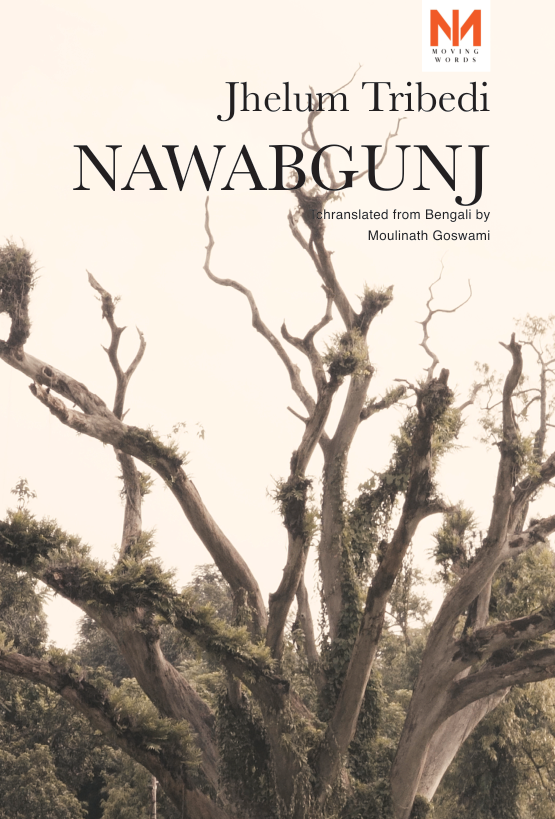TRANSLATED FROM THE BENGALI BY MOULINATH GOSWAMI
This collection of poems is a compilation of Jhelum Tribedi’s reflection on the world that has shaped around her, pivoted on a real yet surreal place named Nawabgunj – the name that aptly contributes to the title of this book. This is planet Nawabgunj, a universe, whose flow in time is synonymous with the evolution of the poet as a human being. This is her birthplace from which she had over time drifted apart along the meander of her life’s uncertain flow. It is this journey that brings her back to the place, both physically and emotionally, after a long separation of about two decades or more. The poems in this book are an oblation to that small-time colonial mofussil by the Ganges, nestled in one remote corner of West Bengal, whose familiar faces and relationships have torn her apart, whose unfamiliar faces have embraced her with unwarranted warmth in her journey of life, whose fauna, flora and sundry other inanimate objects have blessed her with profound insights to life. The book ‘Nawabgunj’ is a grateful tribute to “life’s magnificent rakhi”, as the poet puts it in the opening poem, that places like Ichapore, Palta Park, Baranagore, Suri have beaded themselves into around the poet’s existence, with Nawabgunj as its ever shining centrepiece.
Eyes
A little girl sulks
From her eyes
drop by drop trickles the evening Hooghly ferry-ghat
It is quiet, too quiet all around
A toffee, toffee wind blows,
He who sits alone
his face drips through the tears of the girl
Red is the hue of indulgence today
The boatmen retire in the folds of her gloomy chin
as they wind up the fish-nets of their tales
The rustic old seafarers laugh
their absurd lips puff beedis
the girl’s iris brims with a teary sun
Her father has left today
leaving herself in her own mirror…
* Beedi : An indigenous small thin cigarette made out of rolled tendu leaf stuffed with tobacco flake.
Of Forest – 3
The ambrosial man comes and sits by the highland ridges
Some men feed themselves
on beleric, myrobalan leaf, wild neem, boiled grams
The sun-hemmed wrapper of a night lingers
on red-wattled lapwings, wild parakeets, and on the matty sky
Birds fly away, birds come flying back
Mountain is the sobriquet of getting lost
Divine chariots, illusory
rest close and closer to the hills
Withered leaves fall, wind-swept leaves, coarse
rough leaves…
their caress on the cheek, feels like a watery pond
A desire stems from within
to nestle the leaves between the pages of a book
Once one drifts far away, once past Mahalikharup
the leaves… do they not ever remember!
Echoes of epic lessons being learnt
come floating from Matuknath’s rustic school
the flowing table-book of men, the expanse of human existence
immense… immense…
In this meticulous play of light and murk
this man – a teacher, the man flows
Flows in slow cadence…
He hasn’t eaten at night
he has starved all night
yet he opens his school, for he must teach
Father to many, he’s a pitah with a beaten back
nevertheless
avid, he comes and opens the school
where a handful of boys, a bunch of acute empty stomachs
who never learn their lessons, on whose lips, flies perch
they learn
the flies learn
the entire world learns
lessons on the lives of people, the entire universe learns…
The ambrosial man too closes his eyes, pricks up his mind
and listens to poverty at study
Leaves fall from trees, they will, always
but they shall continue to study even with their breath mortgaged…
Mahalikharup: The name of a hill from the widely acclaimed Bengali novel Aranyak written by Bibhutibhushan Bandyopadhyay.
Matuknath: A character from the novel Aranyak by Bibhutibhushan Bandyopadhyay.
The House that Rains
It rains deep
a rain, secret
in the unkempt forest, blows the ancient wind
the wind with roots
by the roots, a lucent home
in the lying-in room of gleam
love…
Someone soaks the eyes
in the filigreed water of a well
Restive tears on eyelashes
Drowned in water, a house that cries…
The song of the house floats in the flood
scratches of leaves float
a vintage evening, alone and strange
enameled pink
lightning strike of the rumbling clouds
Who sits and writes the sky
in the wilderness
of a well with thousand vents?
Like a bolt in the water
inside the dark domain
wedded to a fictive soul, flows
a mystery house that rains…….
Leaves
The leaves fall, they fall all day… leaves
grandma sweeps and
and gathers more than leaves
Is this wonder, that you call –
Something more than leaves
the grandmother gathers, and gathers
The night piles up with leaves
There’ll be a bonfire tonight
people will warm their bodies
and dry their wounds…
The irrational neighbourhood shall throng
dogged discussions fire up
warming up to the azure
warming up to the sky filled stars…
The arduous burden
of marrying off their daughters shall wash away
There will be weddings in every house
tender winter soft as a child’s lip, the latent afternoon-saree
shall hang macramé from the branches of the brownish tree
The grandma gathers all these –
blessings of Persian lilac, holy motifs
filigreed leaves,
A chaste thorp
where girls are unchained
leaves fall all day, leaves fall throughout the year…
Upon Visiting Suri
I did eat – fritters, chickpea soup, and one intense piece of sweet
dripping sugar syrup
There stood in the sun, a boy and a girl – palms open in asking
I left them in their own penury
and drifted towards the edge of fulfilment
ambling along the shore of Mayurakshi
around me the redolent silence
walking by the banks
leaving the intractable husband behind
an undesirable winter had slowly walked away
Them
the boy and the girl
then sunset
then the sun had ceased to be
from the shores of the womb, calling again
their palms wide open…
Sweets! Sweets! Silent voices of the households
sinking… in the waters of Mayurakshi…
going down like murder…
The Milkwood Flower
If this isn’t affection, then why did you turn empty…
The old vegetable vendor smiles,
slices and hands me tomatoes, yam-beans
The hand of the egg-seller woman sprinkles therapy of salt
I put in my mouth, like a delicate conch, poverty’s rare cure
Come close to me, sit, watch how in the dust of this station
darkness pales in the eyes that stand all day
In his eyes the silence of timeless rice poppadum
The little man too breaks into a smile in the tender breeze
And then
I walk
Then
rice poppadum
your face takes shape in the mist…
“Come back, come back apple of my eye
for you the fragrance of bay leaf, for you the soft welcome refrain
that you walk so much; tell me where the roads merge,
what imprint has the street rendered on the lines of your face?
Come back, come back, come back, return, return”
If this isn’t affection, then you have died in love…
Also, Read A Book Review On “Nawabgunj” By Jhelum Trivedi, Translated from The Bengali by Moulinath Goswami And and published in The Antonym:
Follow The Antonym’s Facebook page and Instagram account for more content and interesting updates.




























0 Comments